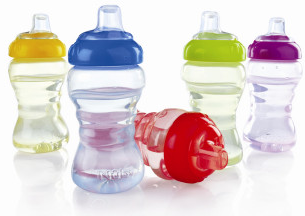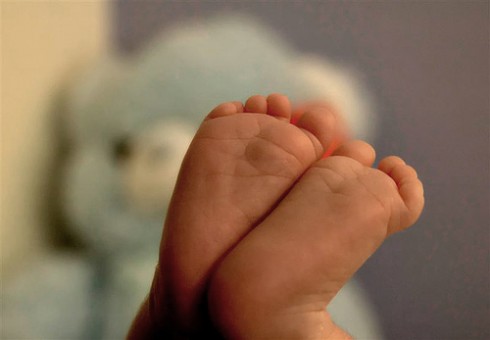Ok, we’ve talked quite a bit about BPA free products (or Bisphenol A). Well, here is one press release that verifies that lawmakers are taking the toxicity of BPA seriously. The Breast Cancer Fund has just announced that the California assembly has disregarded the chemical and pharmaceutical industries scare tactics – they have big money to pay lobbyists to work for them for the “good” of their companies.
However, there appears to be only a few states that have legally banned BPA from baby products. This is listed in the release below, but I will share it here first: “BPA has been banned from baby bottles and children’s sippy cups in Connecticut, Maryland, Minnesota, Washington, Wisconsin, and Vermont, four counties in New York and the City of Chicago.” Considering there are 50 states, it’s sad that more aren’t doing more to protect babies and children. Let’s hope that Governor Schwarzenegger agrees to pass the bill too and that when California has officially done so, more states will follow.
SACRAMENTO, July 1st, 2010 – Today the California state Assembly passed a bill that would ban bisphenol A, or BPA, from food and drink containers designed for children ages 3 and younger. BPA, a synthetic estrogen that has been linked to breast cancer and other serious health problems, is used in some plastic baby bottles and sippy cups, as well as in the lining of infant formula cans and the lids of baby food jars. The bill will now go to the Senate for a concurrence vote (the Senate already passed the bill last year), and then to Governor Schwarzenegger’s desk.
The vote on the “Toxics-Free Babies and Toddlers Act” represents a major blow to the chemical and pharmaceutical industries, which waged an intense lobbying campaign to defeat the bill. Meeting notes leaked last year documented industry’s plans to thwart the California legislation by “befriending people that are able to manipulate the legislative process.” The San Francisco Chronicle reported that industry spent an estimated $5 million against the California legislation. (Editor’s Note: Isn’t that amount amazing?)
“The Assembly voted on the side of science and children’s health,” said Gretchen Lee Salter, policy manager at the Breast Cancer Fund, who led the statewide effort to secure passage of the bill. “The Assembly also cast its vote against industry fear-mongering and scare tactics.”
While the bill sponsors are heartened that the Assembly passed the bill, they note that industry will now focus its attention and resources on pressuring the governor to veto it.
The bill, sponsored by Sen. Fran Pavley, D-Santa Monica, and the Breast Cancer Fund, and strongly supported by Assembly Speaker John Perez, D-Los Angeles, is a response to mounting scientific evidence that exposure to even extremely low levels of BPA can negatively impact health. More than 200 scientific studies show that BPA exposure, particularly during infancy, is associated with a wide range of adverse health effects in later life. In addition to breast cancer, BPA has been linked to prostate cancer, birth defects, infertility in men, early puberty in girls, diabetes and obesity. A main route of human exposure is through the leaching of BPA from food and beverage containers. Once in food, BPA moves quickly into the body. Babies and young children are particularly vulnerable because their bodies are still developing.
BPA has been banned from baby bottles and children’s sippy cups in Connecticut, Maryland, Minnesota, Washington, Wisconsin, and Vermont, four counties in New York and the City of Chicago. Connecticut and Vermont restrict the use of BPA in baby food and infant formula. Sen. Dianne Feinstein, D-Calif., has introduced legislation in the Senate that would ban BPA in infant food packaging, in addition to other food and beverage containers. Feinstein lauded the vote: “I feel very strongly that the government-both federal and state-should protect people from harmful chemicals. I commend the California Assembly for continuing to lead by passing this important legislation to ban BPA in children’s products. I pledge to do all I can on the federal level to see that children are protected from this toxic chemical not just in California, but across the nation.”
In the marketplace, chemical manufacturer Sunoco refuses to sell BPA to companies intending to use it to make products for kids under three. Leading infant formula companies are beginning to use BPA-free packaging, six baby bottle manufacturers have pledged to stop using the chemical, and retailers including CVS, Kmart, Safeway, Toys R Us and Walmart have announced they will stop selling BPA-containing baby bottles. Still, many BPA-containing products remain on store shelves.
“We’re really heartened that the Assembly did the right thing for children, and we hope the governor will, too,” said Karen Farley from the the California WIC Association. “The California WIC Program provides, in addition to breastfeeding support, infant formula to mothers who request it and babies who need it. All mothers should be able to access safe food for their babies. It shouldn’t matter where you shop or what products you can afford. Safe infant food products should be available to all parents in California.”
“Our message to the governor is clear: We can’t wait any longer to protect kids,” said Salter. “No matter what the chemical and pharmaceutical industries say, scientists, health professionals and parents agree that synthetic hormones have no place in infant food packaging.”
# # # 
The Breast Cancer Fund is the leading national organization working to identify and eliminate the environmental causes of breast cancer. www.breastcancerfund.org
Related Articles:
http://www.newsinferno.com/archives/12319#more-12319
http://californiascapitol.com/blog/?p=3317
http://www.breastcancerfund.org/media/press-releases/calif-assembly-approves-bpa-bill.html
http://switchboard.nrdc.org/blogs/sjanssen/bpa_ban_in_california_passes_l.html



It makes me mad that BPA is still allowed in ANYTHING, for infants or otherwise. So disgusting how our society/corporations care more about money than public health and safety.